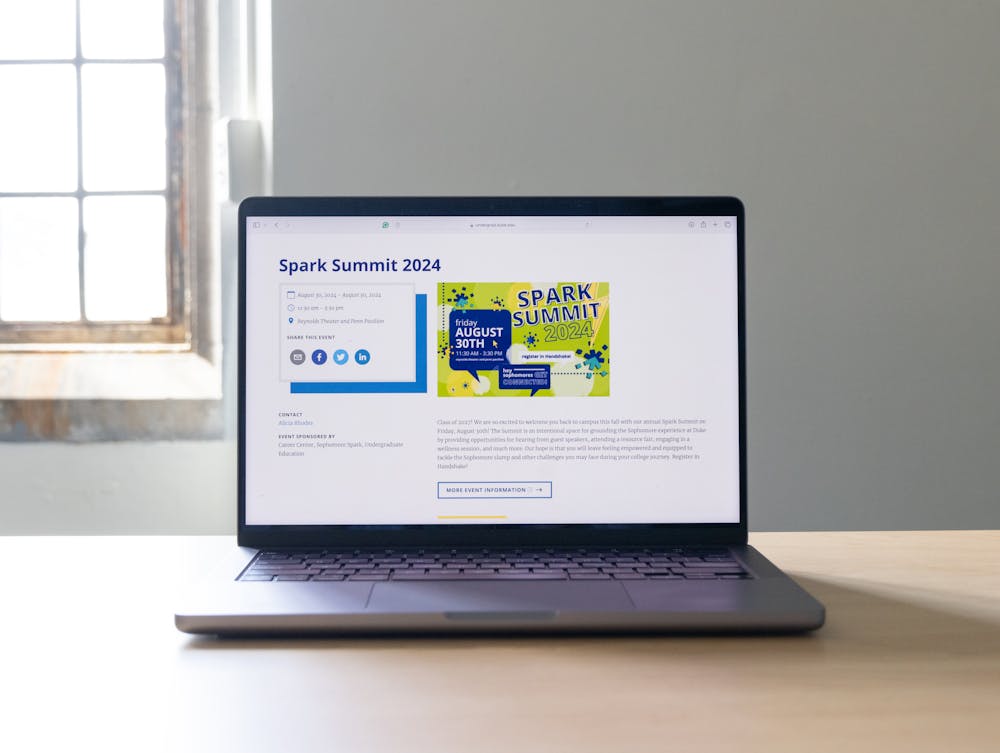Only about 30 of 600 seats of Reynolds Theater were filled at the Aug. 30 Sophomore Spark Summit despite a week-long campaign of emails, yard signs and tabling.
The trend of low attendance is not entirely new: The Career Center has faced ongoing challenges in engaging sophomores. Of the over 1,200 members of the Class of 2027, only about 255 registered for the event.
The Spark Summit was first launched in spring 2022. Now in its fourth iteration, the event aims to be an “intervention that helps sophomores find tools and resources that will ideally diminish what often gets referred to as the ‘sophomore slump,’” according to Greg Victory, assistant vice president of student affairs and Fannie Mitchell executive director of the Duke Career Center.
This year’s event featured an opening lecture from Bryan Sexton, associate professor in psychiatry and behavioral sciences and director of the Duke Center for the Advancement of Well-being Science, as well as a wellness activity led by senior Danica Bajaj and sponsored by DuWell. The initial programming was followed by a resource fair in Penn Pavilion with representatives from the Duke Global Education Office, Academic Advising, DukeEngage and other campus partners.
Sexton’s presentation spotlighted effective, science-backed measures for students to prioritize their well-being and handle the stresses that come with day-to-day life at college and the internship search. He covered toxic positivity, coping with stressors, the impact of burnout on biological age and how to build support systems that enable students to perform at a high level and juggle responsibilities.
Sexton also shared bite-sized wellness activities, as part of the Duke Center for Healthcare Safety and Quality’s WELL-B program. Through this program, participants can take as little as five minutes per day to create a meaningful impact on productivity and health.
Sophomore Arla Ragun, who attended the summit, found Sexton’s address to be “so applicable to a lot of students at Duke.”
“A lot of us are in the grind culture and just work all the time [while] having less time for ourselves,” he said.
However, others missed out on the event due to its timing. Sophomore Aurea Michael was interested in attending the summit but wasn’t able to make it because of her class schedule.
“Being an engineering student, it's very hard to attend events that are in the middle of the day,” she said.
Attendance was higher at the resource fair later in the day than at Sexton’s keynote address, which took place around noon.
Victory mentioned crowdsourcing ideas, working with student QuadEx leaders, conducting Duke-wide surveys and striking a balance between quantity of attendees and quality of programming as potential solutions to the summit’s engagement struggles.
In future years, the Career Center is also looking to spread Spark programming over six weeks and reach a broader swath of students through seminars personalized to students' needs.
As a biomedical engineering major, Michael suggested matching students with medical assistantships or EMT programs to help pre-medical students gain early clinical opportunities, while Ragun suggested providing further resources to international students interested in graduate degrees abroad.
Victory emphasized that events like the Spark Summit encourage students to think critically about the career trajectory that aligns with their values. He highlighted that sophomores often follow “logical pathways” of what to do in their early professional life because they feel that their peers already have their careers planned out.
He recalled hearing parents describe careers with typical pathways like finance, technology, consulting and medicine as “car wash recruiting processes.”
“You drive your car in, and once you line it with that kind of track, it just pulls your car through,” he said. “It’s prescribed.”
By organizing guest lectures and free resources through Spark, Victory hopes to prompt nuanced conversations with students to help them personalize their career paths.
“What are the things [students have] discovered about themselves, their interests, their values in their first year, and … how can they align more with those in their sophomore year?” he asked.
Get The Chronicle straight to your inbox
Sign up for our weekly newsletter. Cancel at any time.

